Furious Woman Forces Her Husband To Bring Their Energetic Dog To Work After It Wakes Up Their Sick Daughter
Moms are amazing. They always put their children first and never seem to stop working.
Whether they're cooking, cleaning, or just trying to keep everyone happy, moms are always on the go. So it's no wonder that mothers are often called the "glue that holds the family together."
They truly are the unsung heroes of the household. But we have to remember that moms are humans too.
They get exhausted just like everyone else, so they need a break every now and then.
If they don't get enough rest, their minds and bodies will break down. This is exactly what a Redditor experienced in her family.
On top of working 12-hour shifts, a user named Apprehensive_Hair512 shared on the "Am I The A**hole?" (AITA) subreddit that she is taking care of her sick daughter. While her husband may be lending a hand, the bulk of the work is still done by her.
The least he could do is make things easier for her at home. Unfortunately, that didn't happen.
You see, they have a dog that becomes unstoppable once it starts to play. It takes about an hour for the pup to chill.
And yet, he decided to play with the canine while their daughter is getting some sleep and his wife also planned to rest. Since there's no way she can handle the dog, the woman angrily tells her husband to bring the dog along with him to work.
Now, the husband is complaining that he can't get any work done. So who's at fault here?
Reddit users weigh in.
The situation
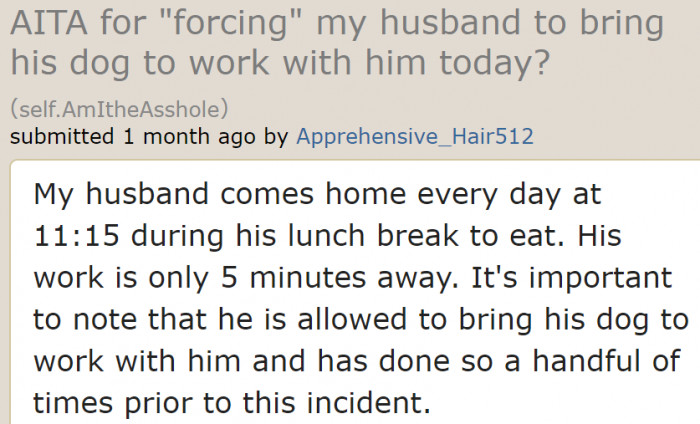
This is how hard she works.
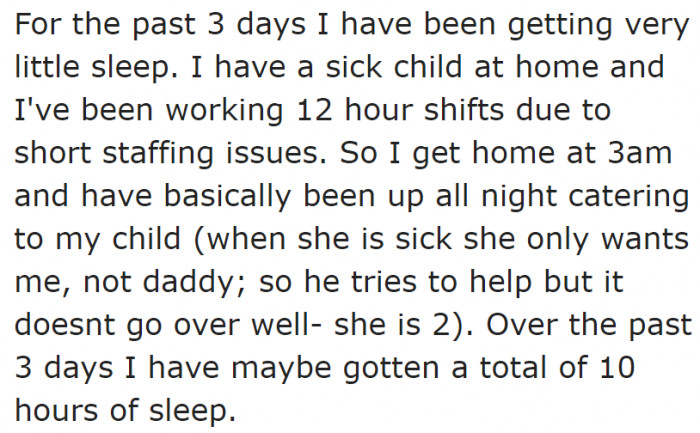
Her husband decides to play with the dog while their child is sick and resting.
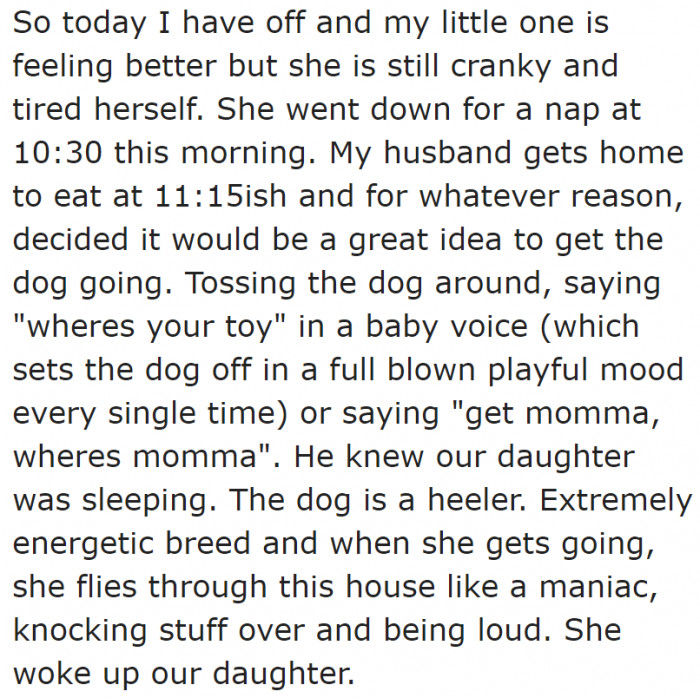
Parental Dynamics and Emotional Labor
Research indicates that mothers often engage in what's known as 'emotional labor'—a term coined by sociologist Arlie Hochschild, referring to the management of emotions to fulfill the emotional needs of others. This is particularly evident in family dynamics where mothers tend to prioritize their children's well-being over their own, often leading to feelings of exhaustion and resentment, as the mother in this scenario has experienced. According to a study published in the Journal of Family Psychology, the burden of emotional labor can accumulate over time, resulting in what researchers call 'emotional overload,' which can detrimentally impact mental health.
Understanding this dynamic is crucial for promoting healthy family interactions. Couples can benefit from open conversations about emotional responsibilities to ensure both partners feel valued and understood, thus alleviating some of the emotional burdens that often fall disproportionately on mothers.
He owns the dog, so he should be aware of its tendencies.
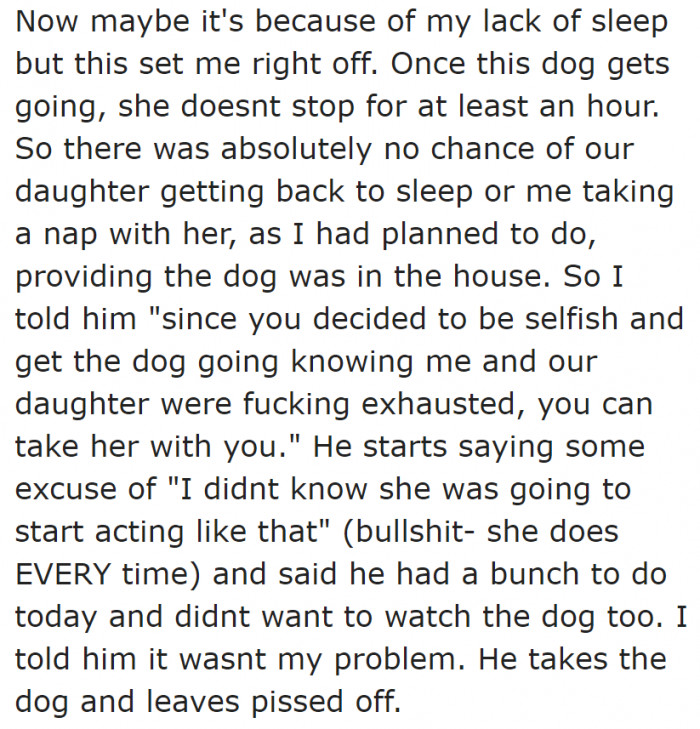
Now, the husband is blaming the wife.

The husband is being insensitive to their needs.

The Role of Communication in Conflict
Effective communication is vital in resolving conflicts, particularly in family structures. Research by Dr. John Gottman, a leading relationship researcher, highlights that couples who engage in constructive conversations about their needs are more likely to experience relationship satisfaction. In this case, the husband's lack of awareness regarding the family's needs illustrates a failure in communication, which can lead to misunderstandings and heightened tensions.
To address this, couples can adopt strategies such as active listening and expressing needs clearly without blaming one another. Engaging in 'I' statements—like 'I feel overwhelmed when our daughter is sick and the dog is energetic'—can foster a more empathic dialogue that encourages mutual support.
Maybe putting up a sign is necessary for a husband this "clueless."
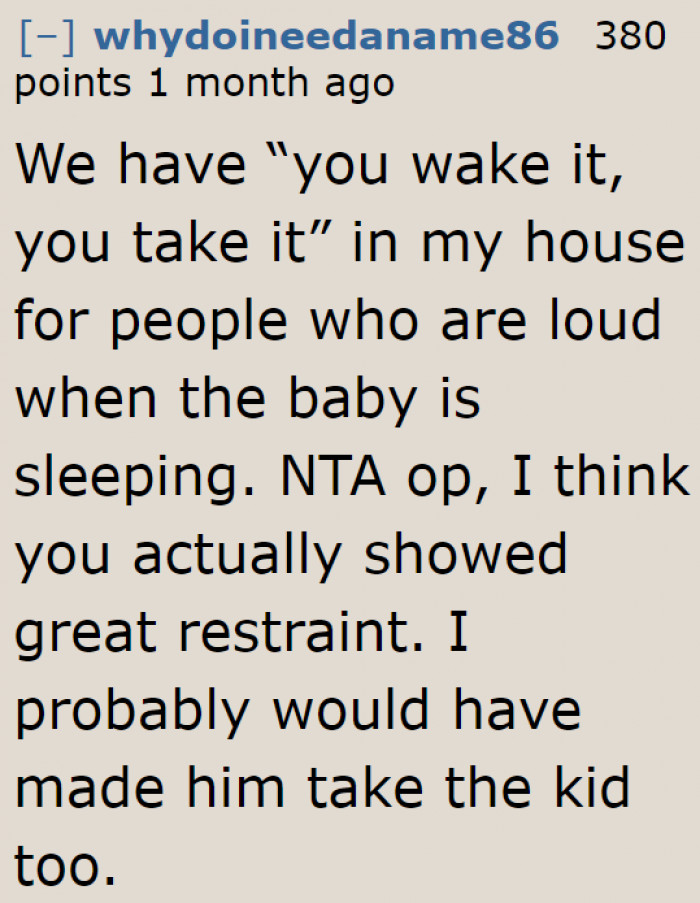
A redditor suggests a phrase for the sign she might need to put up.

Other redditors didn't like that he wanted to put the dog in a crate when it's being rowdy.

Understanding Stress Triggers
The incident described can be attributed to stressors that exacerbate existing tensions within family life. Research shows that stress is often cumulative; when one area of life becomes particularly challenging, it can amplify other stressors. A study published in the International Journal of Environmental Research and Public Health found that parenting stress is linked to both emotional and physical health problems, indicating that when parents are overwhelmed, it can lead to a cycle of conflict and distress.
Recognizing stressors can empower parents to implement stress-reduction techniques, like mindfulness practices or time-outs for self-care, which can help them approach parenting challenges with renewed energy and patience.
While others are completely fine with using a crate.
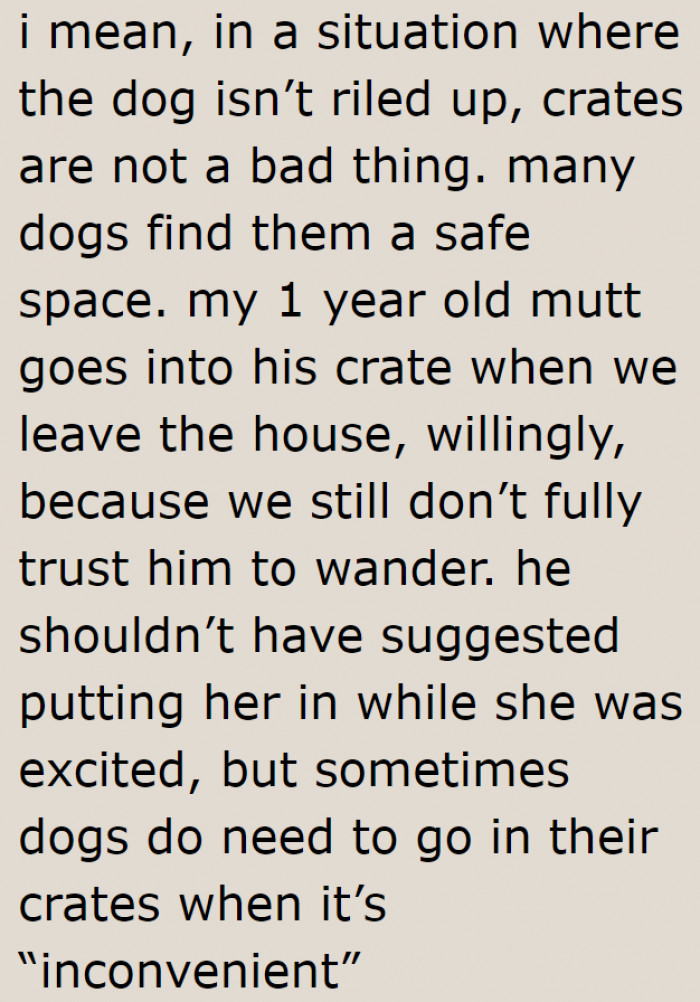
It makes you wonder how this woman manages everything.

As a husband and as a father, he needs to prioritize the needs of his family.
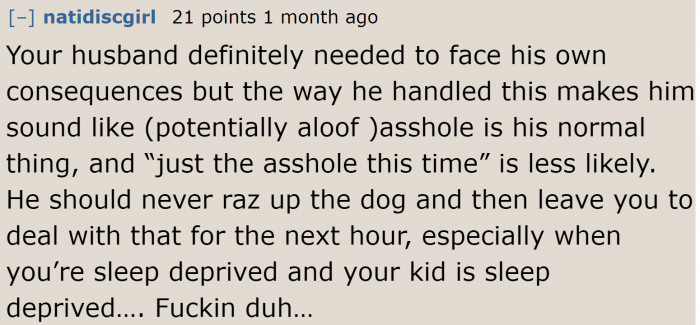
The Impact of Family Roles on Mental Health
Family roles can significantly affect individual mental health. According to family systems theory, each member plays a role that contributes to the overall dynamics of the family unit. When one person feels overwhelmed, such as the mother in this situation, it can disrupt the balance and lead to increased stress for everyone involved. Research by Dr. Murray Bowen emphasizes that understanding these roles can aid in improving family communication and reducing dysfunctional patterns.
To mitigate the impact of these roles, families can benefit from engaging in regular family meetings where members can express their feelings and negotiate roles based on current needs, rather than outdated expectations.
It makes you wonder how the husband can be this insensitive. He's literally living in the same house.

They need to have "the talk."
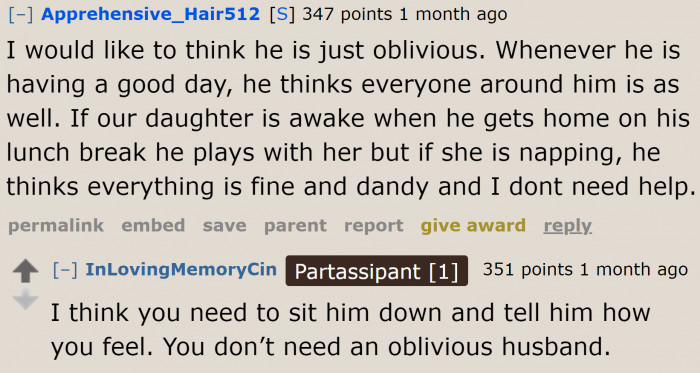
The husband isn't playing his part.
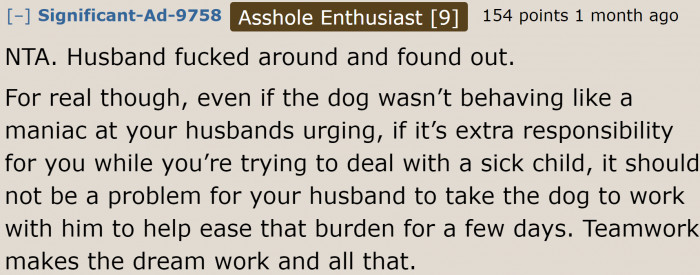
The Effects of Shared Responsibilities
The situation illustrates a common issue in many households: the unequal distribution of responsibilities. Research conducted by the Pew Research Center shows that sharing household tasks correlates with higher relationship satisfaction. When partners feel they are equally contributing to family duties, it fosters a sense of teamwork and shared purpose.
Implementing a chore chart or a weekly family planner can help ensure that responsibilities are shared equitably, allowing both parents to feel more empowered and less overwhelmed. This approach not only distributes the workload but also reinforces teamwork in parenting.
We hope this incident serves as a lesson to the husband.

Thoughtless is the perfect word for this man's actions.

This is part of the challenges of having a child.

Coping Mechanisms for Stressful Situations
In moments of high stress, it’s vital for parents to have effective coping mechanisms. Research shows that adaptive coping strategies, such as problem-solving and seeking social support, can significantly reduce stress levels. A study published in the Journal of Health Psychology highlights the importance of developing a toolkit of coping strategies, emphasizing that the ability to adapt our reactions can lead to improved emotional resilience.
In this scenario, the mother could benefit from reaching out to friends or family, or even joining support groups for parents, which can provide not only emotional support but also practical solutions for managing household challenges.
People are getting pissed off at the husband's actions and attitude.

So true!

The woman is doing a lot for this family. He needs to do the same thing.

The Importance of Empathy in Parenting
Empathy plays a crucial role in effective parenting and relationship dynamics. According to research by Dr. Brene Brown, fostering empathy can significantly enhance emotional connections within families. When parents understand and validate each other's feelings, it can lead to more harmonious interactions and a better environment for children to thrive.
Practicing empathy can involve simple techniques, such as reflecting back what a partner says to ensure understanding. For instance, the husband could benefit from acknowledging his wife’s feelings by saying, 'I understand you’re feeling overwhelmed with our daughter being sick and the dog’s energy.' This validation can go a long way in creating a supportive family atmosphere.
This woman deserves all the rest she can get after her daughter recovers.
Plus, her husband needs to be more attentive to them. As one Redditor said, this family needs teamwork. If the husband isn't doing his part, it will eventually exhaust the wife.
And if her husband keeps being oblivious, perhaps it's time they talk about the problem.
Psychological Analysis
This situation highlights a classic example of the emotional labor often placed on mothers, where they juggle multiple responsibilities and feel overwhelmed when their partners don't recognize the shared stressors. The husband's obliviousness may stem from a lack of communication and empathy, which can create tension in the relationship. It's crucial for couples to openly discuss their needs and responsibilities to foster a supportive environment where both partners feel valued and understood.
Analysis generated by AI
The dynamics of family life can be complex and often challenging, particularly in stressful situations. As highlighted by research on emotional labor and communication, addressing these challenges requires an understanding of each family member's needs and feelings. Building stronger communication skills and sharing responsibilities can foster a healthier family environment. With the right strategies, families can learn to navigate these challenges more effectively, ultimately enhancing their relationships and overall well-being.
By prioritizing empathy and open dialogue, parents can create a supportive network that helps everyone feel valued and understood, ensuring a more harmonious home life.



